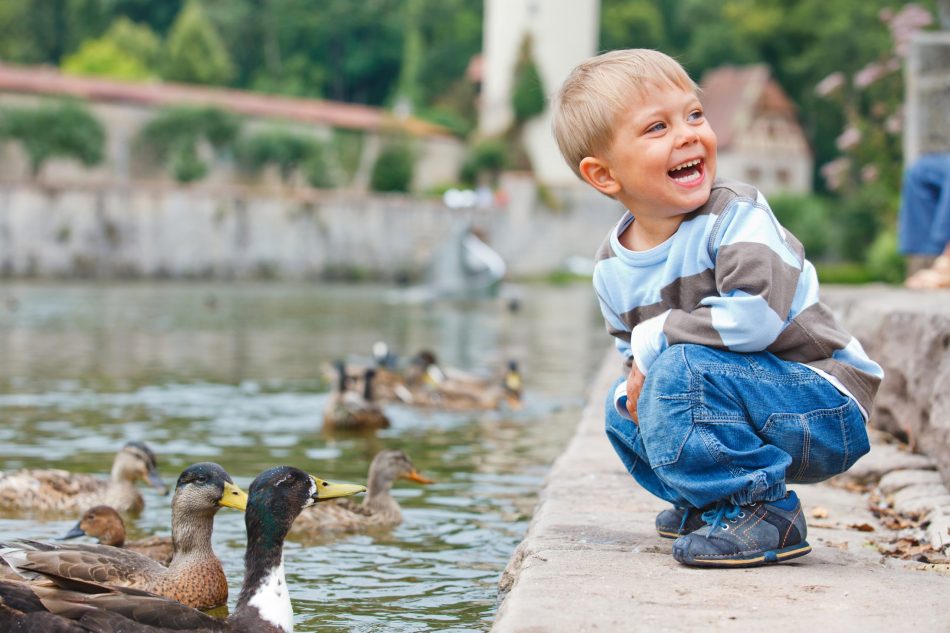BY THE OPTIMIST DAILY EDITORIAL TEAM
When venturing out into the Great Outdoors, it’s important never to feed the wildlife because they can become accustomed to receiving food from humans and may put themselves at risk trying to acquire some. However, it’s not uncommon for local parks to allow residents to feed the ducks (or other types of park birds such as swans and geese), but often, people come armed with the wrong type of food.
The age-old tradition of feeding bread products to birds in the park is actually pretty unhealthy because the bread-making process renders it quite filling with relatively low nutritional value, which could lead to malnourishment and other health issues. If you’d like to serve up healthy snacks for your friendly neighborhood fowl, then read on.
What to feed ducks (and other waterfowl)
A good rule of thumb when choosing what kind of food to provide park fowl is to think about what they would eat in their natural habitats. Vegetables and nutritious grains are good while processed “human” foods should be avoided.
Keep in mind that ducks and their relatives don’t have “teeth,” so chewing is certainly not their strong suit. While their bills can help, they aren’t nearly as effective at breaking down food as our molars are, so be sure to cut salad greens, vegetable peels, nuts, grapes, and other produce into tiny pieces before feeding them the birds.
Frozen mixed peas, corn niblets, and carrot pieces are great options for waterfowl because they’re packed with nutrients and are small enough for the birds to eat whole. Oats, rice, and seeds are good for the same reason. Plus, most of these options are light enough to float on the surface of the water, making them easily accessible for ducks.
If you’re willing to spend a few extra dollars, you can purchase specially formulated waterfowl food that is made for pet birds and farm animals.
What to know about portion control
An important thing to keep in mind is that resident park fowl are most likely not going to go hungry if you don’t stop to feed them. Most are well-equipped to forage for insects, plant life, and other food by themselves, so don’t feel bad if you notice that a few ducks may have missed out on your treats.
Overfeeding waterfowl should be more of a concern, as teaching them to rely on human handouts can throw them off their natural nutritional balance. Remind yourself that it’s better to stop feeding the birds sooner to avoid feeding them too much.
If you do notice that a particular bird is acting strangely or seems unable to feed itself, then call in professional help. Waterfowl that live in parks are vulnerable to many dangers such as being struck by a vehicle or lead poisoning. Remember that feeding park birds may be a temporary kindness, but creating dependency on humans is not a solution.
What to leave at home
Before you begin to feed local birds, be sure to check with park officials about whether it is legal and recommended to feed birds in the area. More and more parks are dissuading the practice due to visitors bringing the wrong types of food. Also note that it is highly illegal to ever feed animals in a National Park.
If you’re now feeling guilty about all the times you may have fed pieces of bread to birds in the park, don’t worry. Snacking on bread won’t kill them, but it is a lot like junk food. It tastes good but doesn’t have many nutrients and too much of it will lead to poor health. Other foods to avoid are:
- More bread products such as stale donuts, crackers, and breadcrumbs.
- Dairy products like cheese cubes or ice cream—ducks cannot digest dairy properly.
- Any plants or food from the nightshade family like eggplants, peppers, potatoes, tomatoes, and some types of flowers and foliage can be highly toxic to ducks.
- Salty or sugary snacks, junk food in general, and highly processed foods.
- Citrus fruits or spinach—these foods can disrupt calcium absorption in ducks and may negatively affect the health of their eggs.
- Any spoiled foods—mold can poison the birds and damage the surrounding environment.
- Food packaging—the world doesn’t need any more litter. Furthermore, if not disposed of properly it can pose a risk to wildlife.











